Search results
Projects
Creative Ecologies
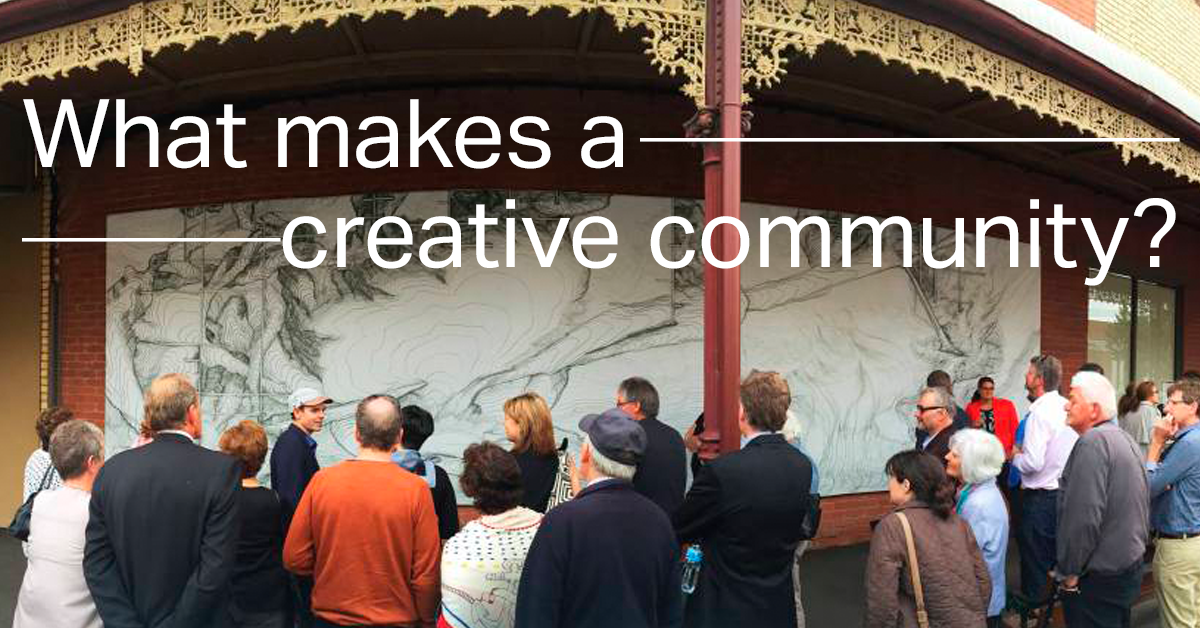
Creative Ecologies is a collaborative investigation into what makes Australia’s creative landscapes tick. The aim is to understand what it takes to build thriving creative communities and then develop tools to foster their growth.
The goal of the project is to develop a simple way of articulating the complex ways creative ecologies operate. Core to this will be highlighting connections to the wider society and demonstrating value beyond purely economic indicators. The long-term ambition of Creative Ecologies is to expand our understanding and appreciation of creative exertion – and have its central place in Australia’s national character recognised. It will do this by developing and raising awareness of a framework and resource for policymakers, practitioners and advocates. This will be a live, interactive visual map of the nation’s creative ecologies, combining data, case studies and avenues for connection across the sector.
The project began in late 2017 and the arising work and findings including a national survey, one-on-one consultations, interactive workshops were presented at the Engaging For Impact conference in February 2018. Creative Ecologies now has an expanded list of RMIT researchers on board
LEAD RESEARCHER
○Jan van Schaik, Senior Lecturer, School Architecture & Urban Design
SUPPORTING RESEARCHERS
○Marnie Badham, Vice Chancellor’s Postdoctoral Fellow, School of Art
○Bronwyn Coate, Senior Lecturer, Economics, Finance and Marketing
○Gretchen Coombs, Postdoctoral Fellow, DCP ECP
○Christine Phillips, Senior Lecturer, Architecture & Urban Design
○Professor Jason Potts, Economics, Finance and Marketing
○Noel Waite, Senior Lecturer, Communication Design
○ Professor Ellie Rennie, Digital Ethnography Research Centre
○Professor Mark Sanderson, Computer Science and Information Technology
You can find out more about CREATIVE ECOLOGIES here.
If you would like to get involved with this project, fill out the form below or reach out to project leaders via the contact info provided alongside each bio.
People
Jan van Schaik
Senior Lecturer
School: Architecture and Urban Design
Jan van Schaik is a practising architect at MvS Architects, a researcher and senior lecturer at RMIT Architecture & Urban Design, and a creative and cultural industries strategist at Future Tense. His is the leader of the ‘Culture and Society’ research stream, and a PhD superrvisor of established architects conducting post-professional reflective practice research. Jan is the founder of the WRITING & CONCEPTS lecture and publication series which reflects of the role that writing plays in visual arts practice. Jan is also one of the founders of Creative Ecologies„ a collaborative investigation into what makes Australia’s creative landscapes tick. The aim is to understand what it takes to build thriving creative communities and then develop tools to foster their growth.
Addressing Gender-Based Violence in Aged Care & Disability Support Services in Individualised Settings
Building stakeholder capacity in Victoria

The growing community concern around violence in disability support and aged care services promoted RMIT researchers to consider ways to improve the lives of both service users and workers in home and community-based support and care. Through a series of workshops, this project provided an opportunity for Victorian advocacy groups, unions and researchers to identify common concerns and interests around gender-based violence in both individualised aged care and disability support services, and consider ways to tackle these issues.
This project led to a 2020 Scoping Study for Worksafe Victoria see report here.
If you would like to get involved with this project, fill out the form below or reach out to project leaders via the contact info provided alongside each bio.
People
Sara Charlesworth
Distinguished Professor
School: Management
Sara Charlesworth is Professor of Work, Gender & Regulation and Deputy Head of School, (Research & Innovation) in the School of Management. She is an executive member of the Centre for People, Organisation & Work in the College of Business. Sara has published and presented widely in a wide range of academic, policy and community fora and has been involved in a number of key gender equality policy reviews and debates. She was a panel member on the 2012 ACTU Independent Inquiry into Insecure Work, and an advisor to the Australian Human Rights Commission on their 2014 Pregnancy and Return to Work National Review and 2018 National Sexual Harassment Prevalence Survey.
In 2017 Sara was appointed to the Equal Workplaces Advisory Council, a founding reform of the Victorian government’s Gender Equality Strategy. She is currently a member of the Victoria Police VEOHRC Review Academic Governance Board, on the Steering Group of the Migrant Workers Rights Campaign and co-convenor of the Work+Family Policy Roundtable. Sara is a Fellow of the Future Social Services Institute and is on the editorial board of the Journal of Industrial Relations.
Sara’s research interests centre on gender inequality in employment at the labour market, industry and organisational levels. She has undertaken a number of Australian Research Council-funded projects. Much of her recent research has focused on paid care work. Together with A/Prof Deb King (Flinders), she completed a large three year Department of Health-funded project, ‘Quality Jobs and Quality Care: Improving work practices to deliver quality aged care jobs & aged care services for older Australians’, in partnership with Brightwater Care, HammondCare, Helping Hand and United Voice.
FireLens
Using mobile phone image-making to improve the safety of planned burning
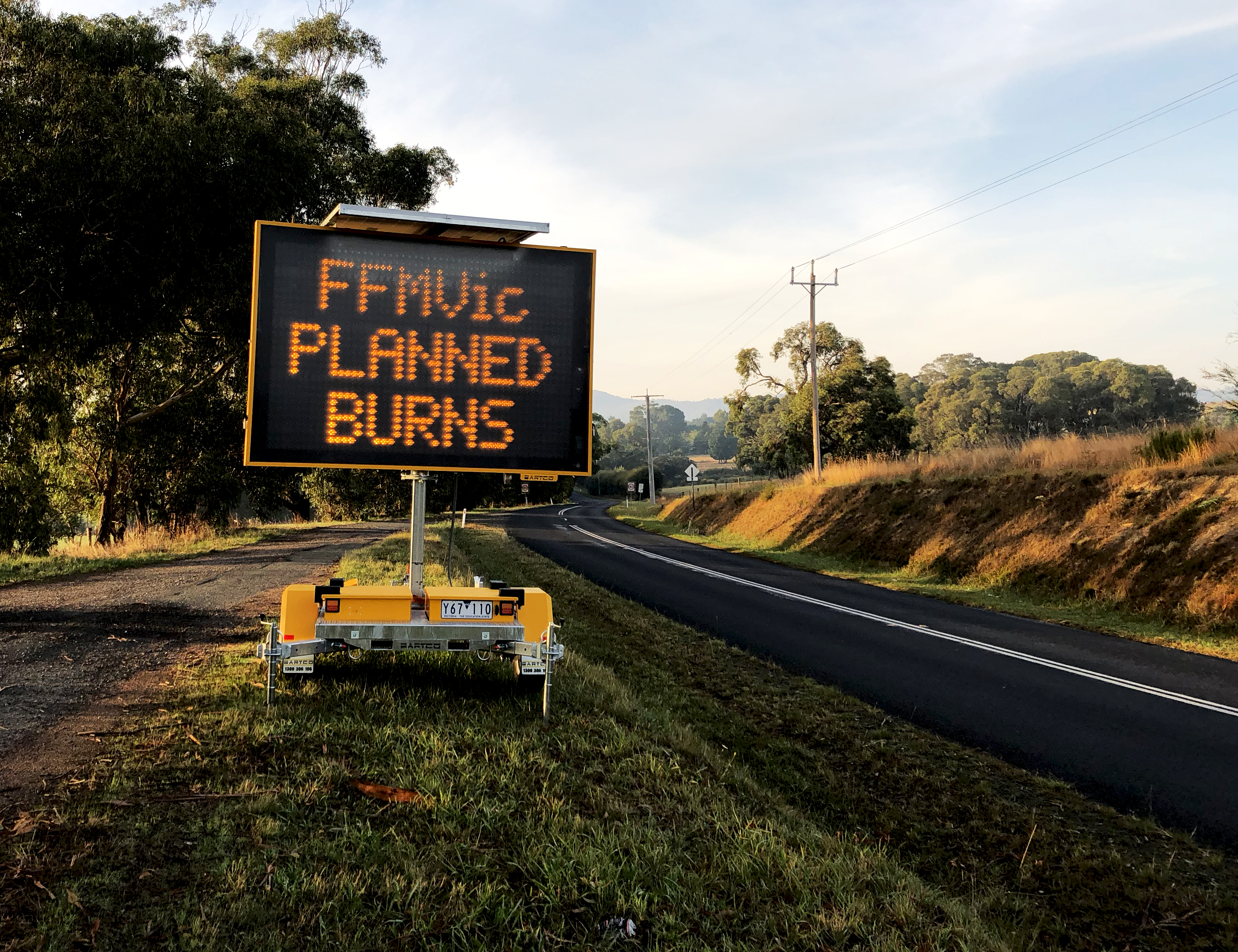
How do organisations manage images to share information and knowledge? The FireLens project is utilising everyday media practices, peer production, mobile and platform technologies to create an image management system for government organisations. Digital photos and videos are composed of imagery, which can communicate complex visual and logistical information.
If you would like to get involved with this project, fill out the form below or reach out to project leaders via the contact info provided alongside each bio.
People
Seth Keen
Lecturer
School: Media and Communication
+61 3 9925 3017
Personal website
seth.keen@rmit.edu.au
Dr Seth Keen is a new media educator, researcher, and designer in the School of Media and Communication. Seth brings together media and co-design practices to engage with contemporary wicked problems. His track record of expertise is in the design of audiovisual media and image-based platforms. He has worked on collaborative projects with academic and industry research partners in the areas of development aid, cultural geography, social services and disaster resilience. Seth is a winner of a prestigious Good Design Australia Award in Social Impact, 2018.
Seth Keen is interested in talking to ARC Linkage collaborators in the areas of Service Design, Computer Science (mobile applications, cloud-based systems) and Bushfire Fuel Management.
Trades Hall GBV Training Package
Evaluate, Enhance & Embed
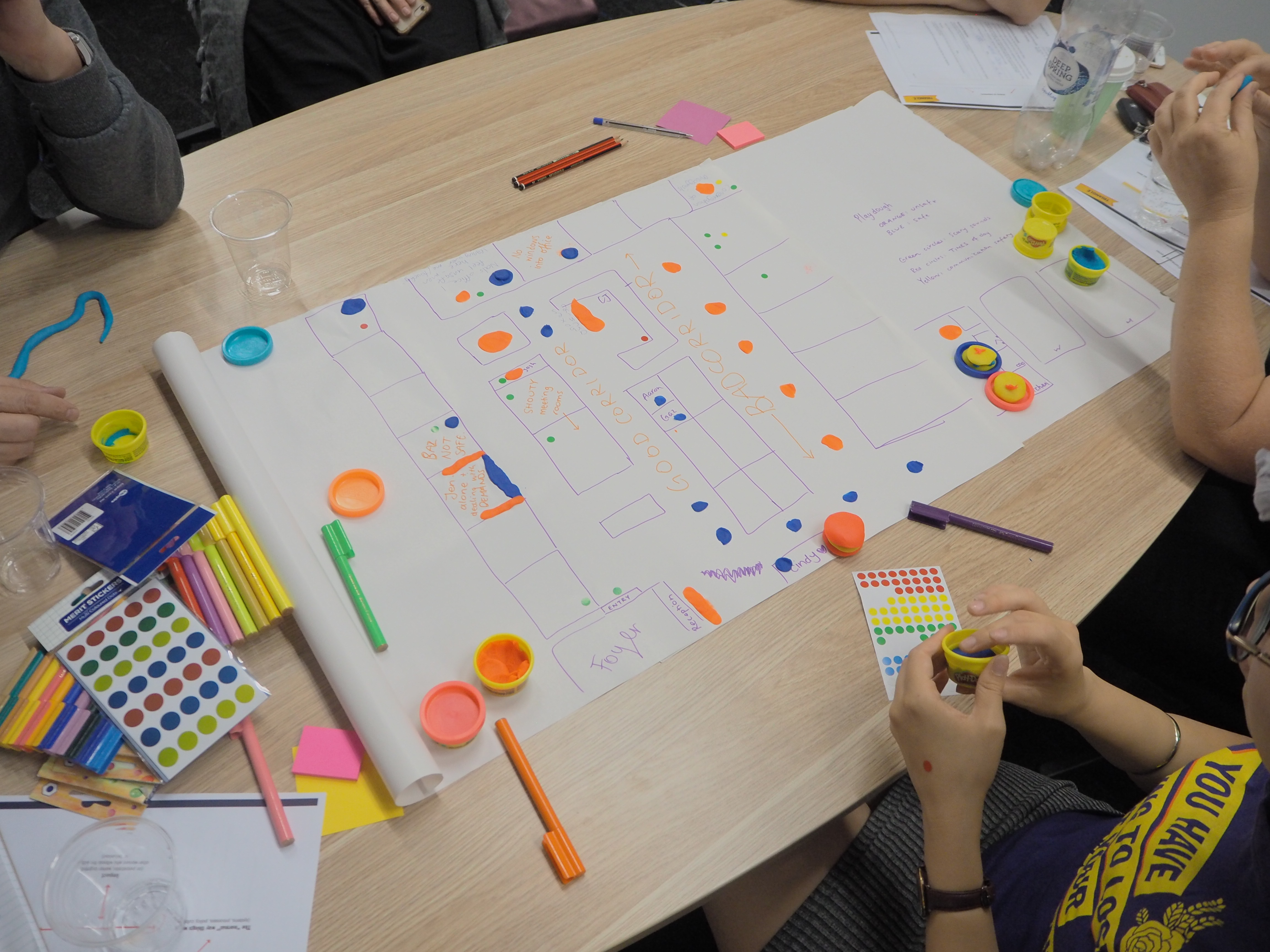
How might we co-design for cultural change for workplaces of the future? How can we co-design with inclusivity at the core? How can we co-create opportunities for social change in workplaces?
This collaboration built on the Victorian Trades Hall Council’s (VTHC) gender-based violence in the workplace training package, designed to advance the rights of people working across Victoria through cultural change towards inclusion, equality, and diversity. The project aim was to have the package evaluated, enhanced and for measurements to be embedded to ensure the aim of the package to change workplace cultures is able to be rolled-out.
To address this aim, the project utilised a series of mixed methods deploying ethnography (interviews and role play scenario case studies), SWOC analysis, multi-sensorial mapping and cultural probes to evaluate, enhance and reflect upon measuring social change.
If you would like to get involved with this project, fill out the form below or reach out to project leaders via the contact info provided alongside each bio.
People
Larissa Hjorth
Distinguished Professor and Director, Design and Creative Practice
School: Enabling Capability Platforms
Larissa Hjorth is a digital ethnographer, artist, Distinguished Professor and director of the Design & Creative Practice ECP platform at RMIT University. With Professor Heather Horst, she co-founded the Digital Ethnography Research Centre (DERC). Previously, Hjorth was Deputy Dean, Research & Innovation, in the School of Media & Communication (2013−2016). Hjorth served on the inaugural Australian Research Council (ARC) Engagement & Impact Pilot study assessment panel for humanities and creative practice.
Hjorth studies the socio-cultural dimensions of mobile media and play practices in the Asia-Pacific region with an emphasis on interdisciplinary, collaborative and cross-cultural approaches. She has published a dozen co-authored books, edited over a dozen Handbooks/Companions and has over 40 journal articles.
More recently, Hjorth’s work has become concerned with how we can bring creative, social and design solutions to the growing ageing populations and, in turn, how we might consider scenarios of what it means to die well. She is also studying how our “more-than-human” companions can teach us about new media in everyday life. Hjorth’s last book, Haunting Hands (Oxford Uni Press) looked at how mobile media is being deployed in situations of grief and trauma, her previous book explored how art practice can teach us new acumen into the climate change debate.
Hjorth’s books include Haunting Hands (with Cumiskey 2017), Screen Ecologies (with Pink, Sharp & Williams 2016), Digital Ethnography (Pink et al. 2016) Mobile Media in the Asia-Pacific (2009), Games & Gaming (2010), Online@AsiaPacific (with Arnold 2013), Understanding Social Media (with Hinton 2013), and Gaming in Locative, Social and Mobile Media (with Richardson 2014).
Jaz Hee-jeong Choi
Vice-Chancellor’s Senior Research Fellow
School: Design and Social Context
Dr Jaz Hee-jeong Choi is a Vice-Chancellor’s Senior Research Fellow at the Digital Ethnography Research Centre at RMIT. Previously, she was a Founding Member and the Director of the QUT Urban Informatics Research Lab, a transdisciplinary research group exploring and designing at the intersection of people, places, and technologies. She also founded the SIGCHI FoodCHI Network.
She is an advocate for transdisciplinary research, carefully balancing creativity and criticality. Her approach to urban sustainability recognises ‘play’ as the core of transformative interactions in cities as complex techno-social networks. She builds on this to explore how various forms of digital and playful experiences are designed and evolve in different cultural contexts. Her current research explores designing with and for care for liveable and equitable urban futures across three inter-related domains: wellbeing and ageing; impactful research methods, and; co-creative urban transformation.
She has collaborated with leading international researchers, published in books and journals across various disciplines, and given invited talks at major international conferences including the inaugural Global Social Economy Forum in 2013 and the opening keynote at the 2010 UNESCO Creative Cities Conference.
Jenny Kennedy
Postdoctoral Research Fellow
School: Design and Social Context
Jenny Kennedy is a Postdoctoral Research Fellow in Media and Communication at RMIT University, Melbourne. Her research interests cover media practices in everyday life, social discourses around technology use and material culture, especially in domestic contexts. She is a core member of the Technology, Communication and Policy Lab in DERC.
She is currently working on projects around digital inclusion, and AI and automation in home environments.
Aesthetics, Politics and Histories: The Social Context of Art
AAANZ Conference 2018
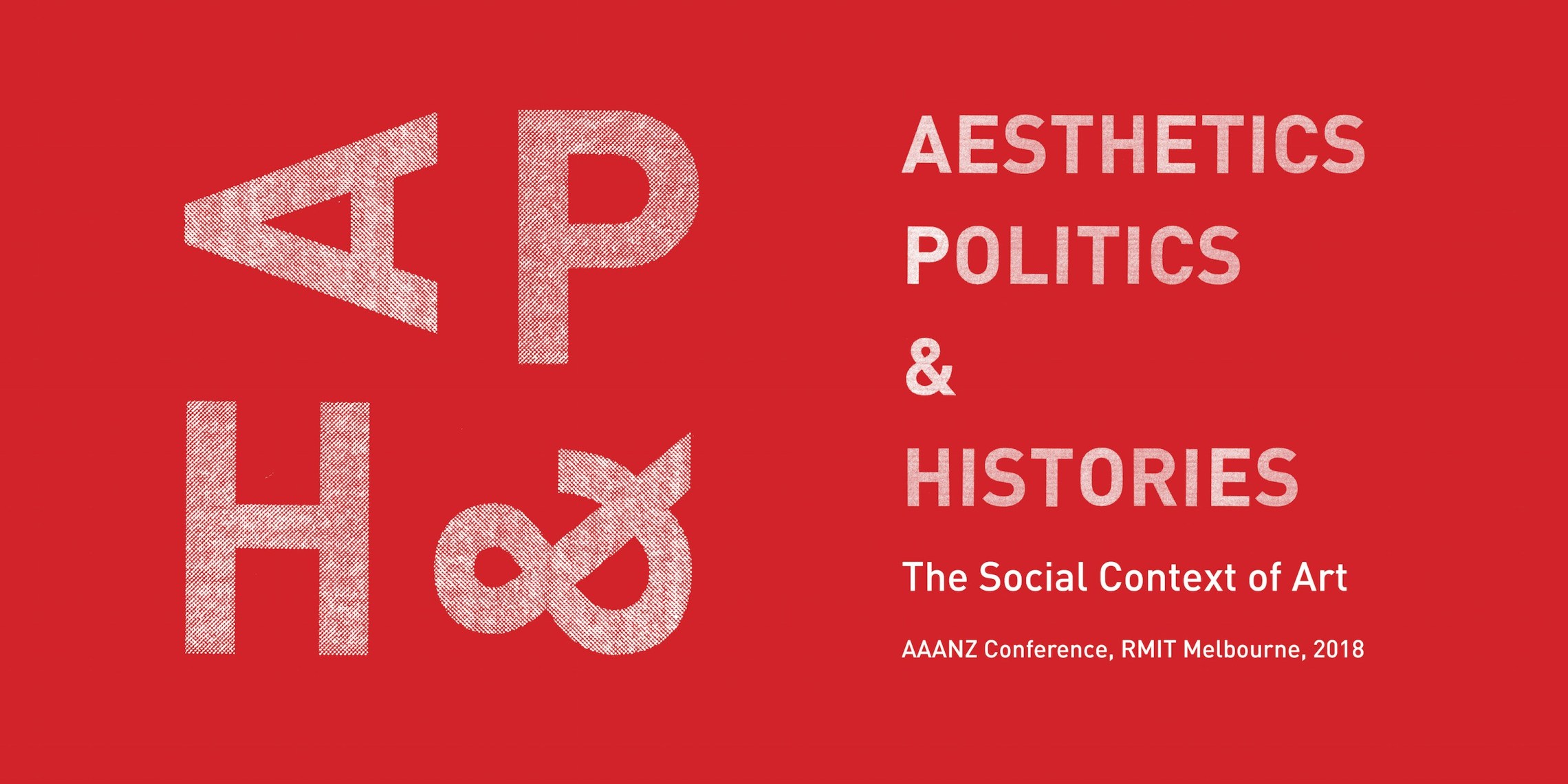
The 2018 AAANZ conference opens critical dialogue on the histories of art by examining the social contexts of aesthetics and politics. Bringing together art historians, theorists, curators, critics, and artists from across the region, the conference offers a stimulating four-day program of panels and papers, publication prizes, masterclasses and encounters with Melbourne’s vibrant arts sector with a parallel artistic program to be announced in coming months.
The conference features distinguished keynote speakers who will present expanded and alternative frameworks for understanding the diverse contexts and histories of art. Gabi Ngcobo (South Africa), curator of the 10th Berlin Biennale; Genevieve Grieves (AUS), Head of the First Peoples Department at Museums Victoria; and Ema Tavola (Fiji), independent curator are each engaged in critical curatorial practices aimed at democratising and decolonising art institutions and opening up art collections to alternative perspectives and narratives traditionally overlooked by museums and galleries. Art historian Professor Griselda Pollock (UK) from Leeds University is renowned for her postcolonial, queer feminist analysis of the visual arts, visual culture and cultural theory and research of trauma and the aesthetic in contemporary art. Curator and Associate Professor David Teh specialises in contemporary art in Southeast Asia.
The intersection of art and society is where differing worldviews and opposing epistemologies can meet and clash. Art offers a site for modelling political alternatives, questioning dominant discourses, and producing new historical narratives. Responding to the political, economic and environmental tensions of the present moment, the conference explores the relationship of the arts to social life throughout history. Located in a region marked by multiple and overlapping colonial and postcolonial histories and contemporary processes of globalisation, the conference aims to initiate critical dialogues that foreground the complex contexts, diverse practices, multiple histories, and contested trajectories of art.
KEYNOTE SPEAKERS
Genevieve Grieves is Worimi – traditionally from mid north coast New South Wales – and has lived on Kulin country in Melbourne for many years. She is an educator, curator, filmmaker, artist and oral historian who has accumulated nearly twenty years’ experience in the arts and culture industries. Some of her projects include the documentary, Lani’s Story; the video installation, Picturing the Old People; and, she was the Lead Curator of the internationally award-winning First Peoples exhibition at the Melbourne Museum. Genevieve has a role as a public intellectual and speaker and is undertaking her PhD in arts, memorialisation and frontier violence. She is Head of the First Peoples Department at Museums Victoria.
Gabi Ngcobo is the curator of the 10th Berlin Biennale. Since the early 2000s Ngcobo has been engaged in collaborative artistic, curatorial, and educational projects in South Africa and on an international scope. She is a founding member of the Johannesburg based collaborative platforms NGO – Nothing Gets Organised and Center for Historical Reenactments (CHR, 2010 – 14). NGO focusses on processes of self-organization that take place outside of predetermined structures, definitions, contexts, or forms. CHR responded to the demands of the moment through an exploration of how historical legacies impact and resonate within contemporary art.
Recently Ngcobo co-curated the 32nd Bienal de São Paulo, which took place in 2016 at the Ciccillo Matarazzo Pavilion in São Paulo, and A Labour of Love at Weltkulturen Museum, Frankfurt am Main in 2015⁄16) and travelled to the Johannesburg Art Gallery in 2017. She has been teaching at the Wits School of Arts, University of Witswatersrand, ZA, since 2011. Her writings have been published in various catalogues, books, and journals. She currently lives and works between Johannesburg and Berlin.
You can find out more about the event here.
If you would like to get involved with this project, fill out the form below or reach out to project leaders via the contact info provided alongside each bio.
People
Marnie Badham
Senior Research Fellow/ Senior Lecturer
School: School of Art
With a twenty-five-year history of art and social justice practice Australia and Canada, Marnie’s research sits at the intersection of socially engaged art, community-based research methodologies and the politics of cultural measurement. Marnie is currently focused on a series of creative cartographies registering emotion in public space; expanded curation projects on the aesthetics and politics of food; and a book project The Social Life of Artist Residencies: connecting with people and place not your own. Marnie is Senior Research Fellow at the School of Art following the prestigious award of Vice Chancellor’s Postdoctoral Research Fellow at RMIT University. Marnie co-leads the Cultural Value Impact Network and is acting Leader for CAST Contemporary Art and Social Transformation research group.
Daniel Palmer
Associate Dean
School: School of Art
Daniel Palmer is Associate Dean of Research and Innovation in the School of Art at RMIT University.
Daniel Palmer’s research and professional practice focuses on contemporary art and cultural theory, with a particular emphasis on photography and digital media. Prior to joining RMIT in 2018, Palmer was Associate Dean of Graduate Research and Associate Professor in the Art History & Theory Program at Monash Art, Design & Architecture. He also has a long association with the Centre for Contemporary Photography in Melbourne, first as a curator and later on the board of management.
Palmer’s book publications include Photography and Collaboration: From Conceptual Art to Crowdsourcing (Bloomsbury 2017); Digital Light (Open Humanities Press, 2015), edited with Sean Cubitt and Nathaniel Tkacz; The Culture of Photography in Public Space (Intellect 2015), edited with Anne Marsh and Melissa Miles; Twelve Australian Photo Artists (Piper Press, 2009), co-authored with Blair French; and Photogenic (Centre for Contemporary Photography, 2005). His scholarly writings on photography and contemporary art have appeared in journals such as Photographies, Philosophy of Photography, Angelaki, Reading Room and the Australian and New Zealand Journal of Art. Palmer has also published over sixty catalogue essays and fifty art reviews since 1997, in art magazines including Art and Australia, Photofile and Frieze.
Palmer has been the recipient of various awards and grants, and has been Chief Investigator on multiple ARC projects, including the ARC Discovery Project ‘Genealogies of Digital Light’ (2008 – 11) with Sean Cubitt and Les Walkling; an ARC Linkage Project ‘Photography as a Crime’ (2009 – 2012) with Anne Marsh, Melissa Miles, Mark Davison and the Centre for Contemporary Photography; and the ARC Discovery Project ‘Curating Photography in the Age of Photosharing’; (2015 – 2017) with Martyn Jolly. Palmer is currently a researcher on the ARC Discovery Project ‘Digital Photography: Mediation, Memory and Visual Communication’ (2020 – 2022) with Scott McQuire, Nikos Papastergiadis, Sean Cubitt and Celia Lury.
Cold Climate Landscapes and Atmospheres
Examining the effects of global warming on cold climate ecologies
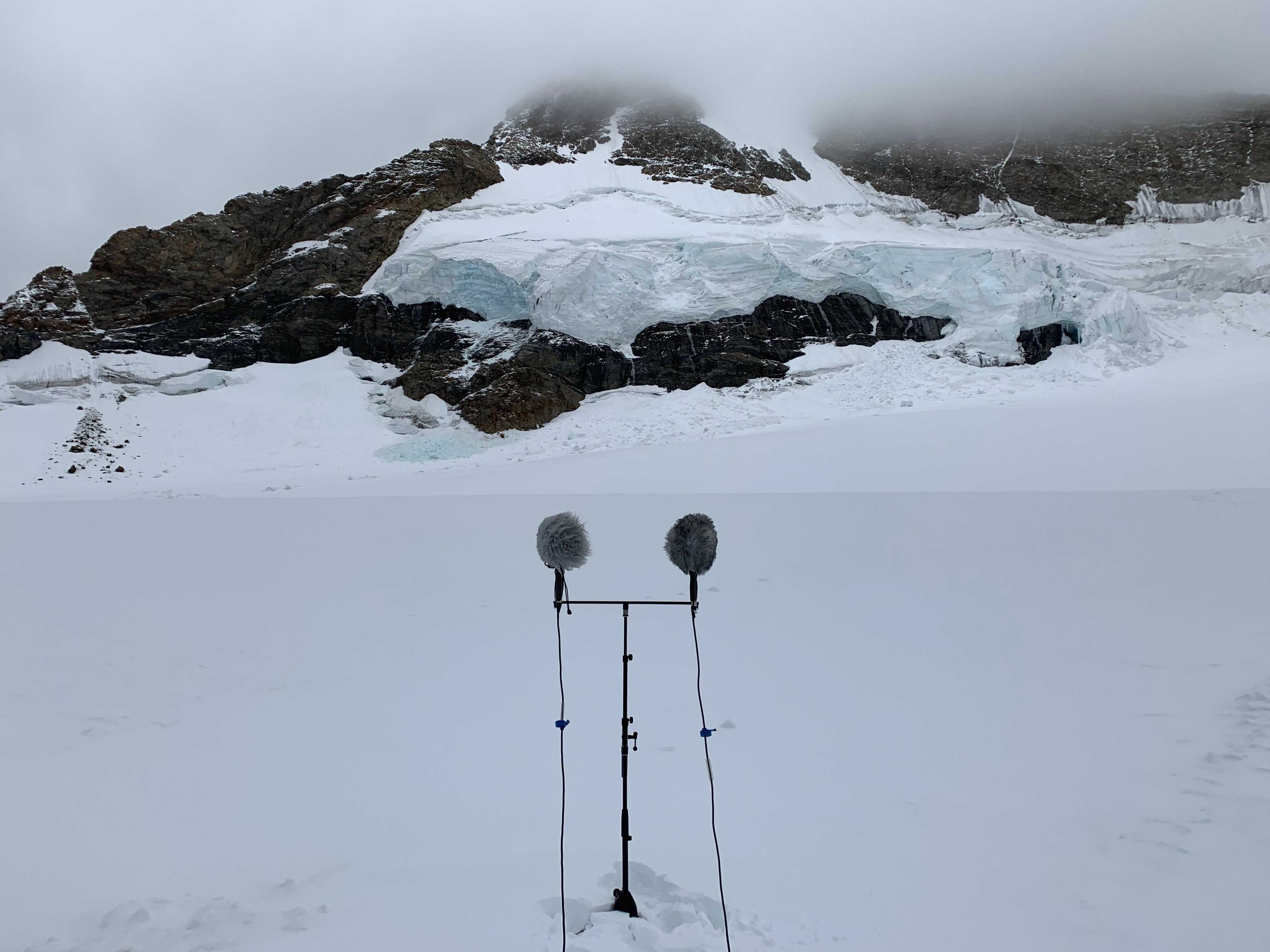
This project explores the impact of extreme climate and weather events on rarefied wilderness environments through the process of sound mapping to reveal the transformations occurring on the margins of our planet, and yet central to the health and wellbeing of everyone. Art is a powerful agent and advocate in how these transformations are perceived and the actions required to mitigate destructive behaviours and their long-term consequences.
“I’m not a scientist but I’m using art to articulate some of these observations and concerns to a much broader audience.”
— Lead researcher, Philip Samartzis in SWI swissinfo.ch, This is what the changing Alps sound like, 20 December 2019.
If you would like to get involved with this project, fill out the form below or reach out to project leaders via the contact info provided alongside each bio.
People
Philip Samartzis
School: School of Art
Philip is an Associate Professor within RMIT School of Art, and leader of the Sound Art and Audio Culture Lab.
Associate Professor Samartzis is a sound artist, scholar and curator with a specific interest in the social and environmental conditions informing remote wilderness regions and their communities. His art practice is based on deep fieldwork where he deploys complex sound recording technology to capture natural, anthropogenic and geophysical forces. The recordings are used within various exhibition, performance and publication outcomes to demonstrate the transformative effects of sound within a fine art context. He is particularly interested in concepts of perception, immersion and embodiment in order to provide audiences with sophisticated encounters of space and place. Philip is the recipient of three Australian Antarctic Division Arts Fellowships (2009, 2015, 2020), which he is using to document the effects of extreme climate and weather events in Eastern Antarctica, Macquarie Island, and the Southern Ocean over a 12-year period.
4th Annual MARC Symposium
Redefining Quality in Ageing and Aged Care
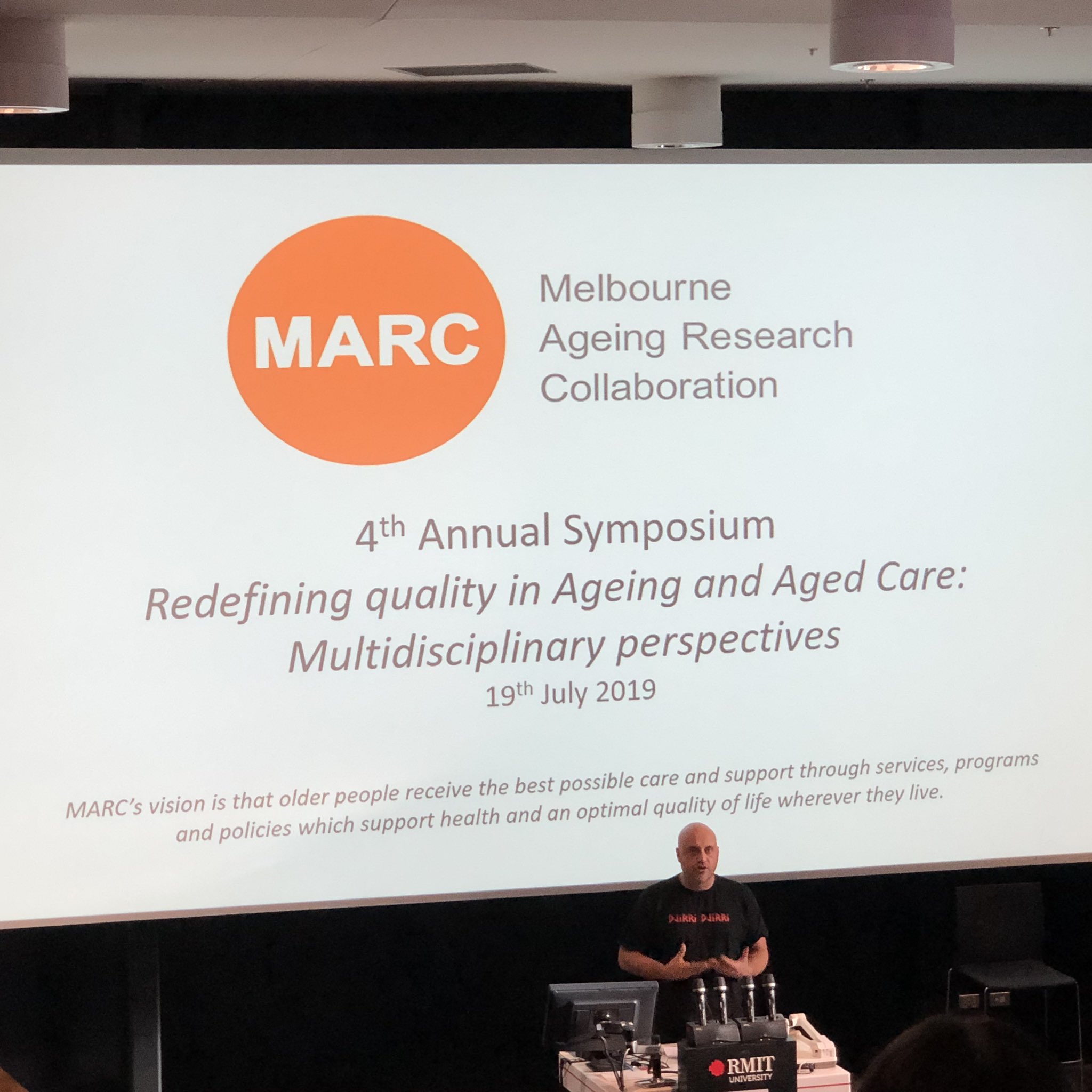
Australia’s population is ageing. By researching ageing now and creating an evidence base for all the aspects of life and society affected by ageing we are helping to build a better future for all.
This event provided an opportunity to hear from leaders from across the continuum of ageing and aged care services, from hospitals and aged care to allied health and primary health, to economic and policy contexts. An expert panel also discussed how we define quality in both ageing and aged care.
See the Symposium agenda here.
If you would like to get involved with this project, fill out the form below or reach out to project leaders via the contact info provided alongside each bio.
Playable City Melbourne
Making the City a Platform for Play
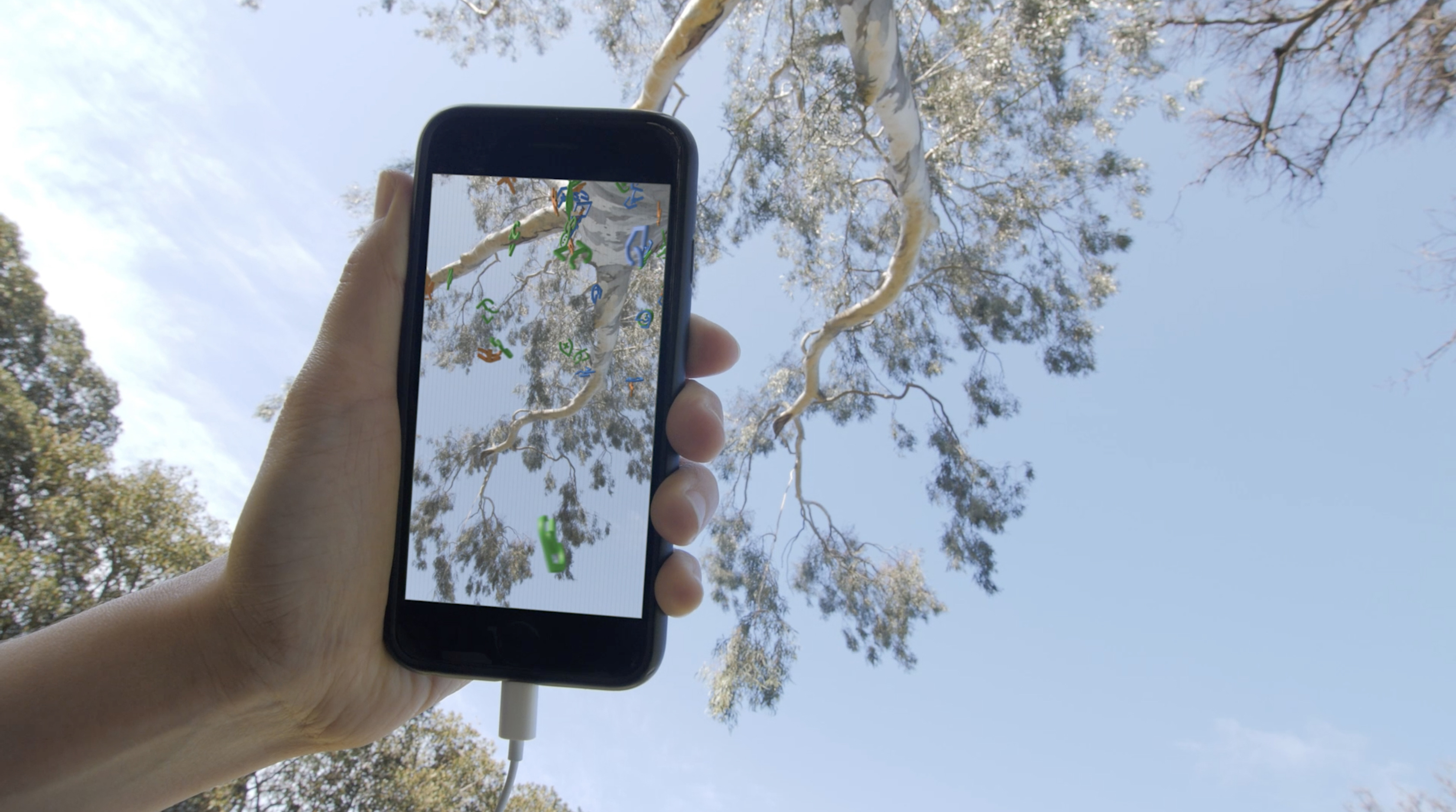
Playable cities connect people and place through creative technologies, making the city a platform for play. Playable City Melbourne is a three-year project bringing together an interdisciplinary urban play community.
During Melbourne International Games Week 2019, Playable City Melbourne is calling for a diverse community of designers, game developers, scientists, writers, architects, artists, producers, performers, players, bureaucrats etc to learn more about urban play and join in the conversation. This conference will explore other ways of being in public space, First Peoples connection to place, and more-than-human infrastructure. Playable City Melbourne talks to the city’s multi-layered civic identity – as a creative city, technological city, a diverse and multicultural city, knowledge city and liveable city that is growing fast.
If you would like to get involved with this project, fill out the form below or reach out to project leaders via the contact info provided alongside each bio.
People
Troy Innocent
VC Research Fellow
School: School of Design
Dr Troy Innocent is an artist, academic, designer, coder, educator, and VC Senior Research Fellow at RMIT University, where his creative practice research explores the city as platform for play through an inventive blend of live art, game design and public art. Over the past ten years he has explored the lived experience of cities through mixed realities; situating his work in Melbourne, Bristol, Barcelona, Istanbul, Ogaki, Sydney and Hong Kong. As Melbourne Knowledge Fellow, Innocent expanded his ‘urban codemaking’ practice for situating play in cities to develop Playable City Melbourne, a three-year project bringing together an interdisciplinary urban play community. He is currently artistic director of 64 Ways of Being, a playable city-wide platform for augmented reality experiences supported by a Creative State Commission.
Possum Skin Cloak Story
Reconnecting Communities and Culture
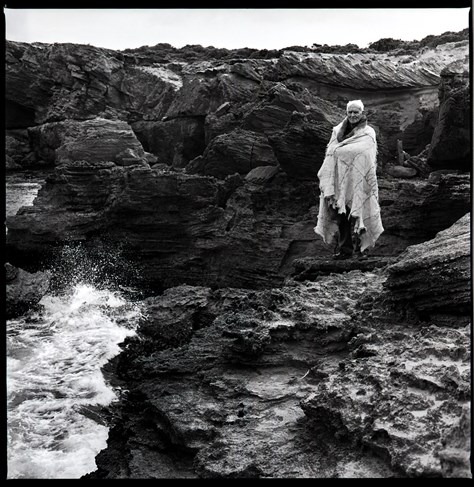
“Culture is the framework through which we connect to our Country, our Belonging. It defines and makes us who we are. Our language, stories, songs, dance, artefacts, cultural knowledge and practices demonstrate our continuing connections.” — Vicki Couzens.
Possum skin cloaks were a vital part of Aboriginal peoples lives in pre-European times. To make a cloak was a very labour intensive and time-consuming process. Telling the story of the Possum Skin Cloak strengthens cultural identity, connection to country and health, and education and justice within an indigenous community context. The impact of the revival of possum skin cloaks as a community cultural practice has been significant and profound.
If you would like to get involved with this project, fill out the form below or reach out to project leaders via the contact info provided alongside each bio.
People
Vicki Couzens
VC Indigenous Research Fellow
School: Design and Social Context
Dr Couzens is Gunditjmara from the Western Districts of Victoria. She acknowledges her ancestors and elders who guide her work.
Dr Couzens has worked in Aboriginal community affairs for almost 40 years. Her contributions in the reclamation, regeneration and revitalisation of cultural knowledge and practice extend across the ‘arts and creative cultural expression’ spectrum including language revitalisation, ceremony, community arts, public art, visual and performing arts, and writing. She is a Senior Knowledge Custodian for Possum Skin Cloak Story and Language Reclamation and Revival in her Keerray Woorroong Mother Tongue.
Vicki is employed at RMIT as a Vice Chancellors Indigenous Research Fellow developing her Project ‘watnanda koong meerreeng , tyama-ngan malayeetoo (together body and country, we know long time)’ The key objective of this Project is to produce model/s, pathways and resources for continuing the reinvigoration of Aboriginal Ways of Knowing Being and Doing with a special focus on language revitalisation.
Rainbow Ranges
Co-creating digital tools for vitalism with LGBTQI+ youth
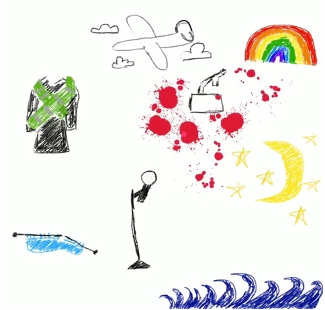
This pilot study set out to disrupt the dominant understandings of queer youth centred on narratives of vulnerability and distress.
Working with LGBTQI+ youth based in regional Victoria, Rainbow Ranges investigated how these young people understood and experienced vitality and aliveness through a series of creative arts-based workshops. The project team and young people co-created a concept for digital intervention to promote a sense of belonging, foster social connections, and improve the wellbeing of LGBTIQ+ identifying individuals and communities.
If you would like to get involved with this project, fill out the form below or reach out to project leaders via the contact info provided alongside each bio.
People
Anne Harris
Associate Professor and Principal Research Fellow, Design and Social Context
School: Education
+61 3 9925 4459
RMIT staff profile
anne.harris@rmit.edu.au
Dr Anne M. Harris, PhD is an Associate Professor and Vice Chancellor’s Principal Research Fellow at RMIT University, and an Australian Research Council Future Fellow (2017 – 2021) studying intercultural creativity. Anne is an Honorary Research Fellow at University of Nottingham (UK) and an Adjunct Professor at Monash University (Australia).
Their research is in the areas of gender, creativity, diversity, performance and emerging digital ethnographies. Anne is a native New Yorker and has worked professionally as a playwright, teaching artist and journalist in the USA and Australia. They have authored or co-authored over 60 articles and 13 books on creativity, arts, and non-dominant culture formations, the latest being Queering Families/Schooling Publics: Keywords (with Stacy Holman Jones, Sandra Faulkner, and Eloise Brook, Routledge 2017). Anne is the creator and series editor of the Palgrave book series Creativity, Education and the Arts, and recently completed an Australian Research Council DECRA on the commodification of creativity.
Troy Innocent
VC Research Fellow
School: School of Design
Dr Troy Innocent is an artist, academic, designer, coder, educator, and VC Senior Research Fellow at RMIT University, where his creative practice research explores the city as platform for play through an inventive blend of live art, game design and public art. Over the past ten years he has explored the lived experience of cities through mixed realities; situating his work in Melbourne, Bristol, Barcelona, Istanbul, Ogaki, Sydney and Hong Kong. As Melbourne Knowledge Fellow, Innocent expanded his ‘urban codemaking’ practice for situating play in cities to develop Playable City Melbourne, a three-year project bringing together an interdisciplinary urban play community. He is currently artistic director of 64 Ways of Being, a playable city-wide platform for augmented reality experiences supported by a Creative State Commission.
Katherine Johnson
Professor
School: Social and Global Studies
Professor Katherine Johnson is Director of the Social and Global Studies Centre at RMIT University.
Katherine has been a visiting professor in gender studies at the University of Sydney, Australia (2007), in social psychology and psychosocial interventions at Universitat Autònoma de Barcelona (2009−2012), in participatory-action research and LGBT health inequalities at the Universidade Federal de Sao Paulo, Brazil (2016) and the Universidad de Colima, Mexico (2016). She is currently Visiting Professor at the University of Brighton, UK where she previously established the Division of Applied Psychology & Psychotherapy and the Centre for Research Excellence, Transforming Sexuality and Gender.
Her research is in the field of gender, sexuality and mental health, with specialisms in critical community psychology and psychosocial studies, qualitative, participatory and visual research methods, and interdisciplinary research about LGBTQ lives. Her research collaborations and partnerships focus on improving the lives of LGBTQ+ people and have impacted on social policy and practice, particularly in the field of suicide prevention, mental health and end of life care.
Katherine is an Associate Fellow of the British Psychological Society, Past Chair of the Psychology of Women and Equalities Section, and a member of the World Professional Association for Transgender Health (WPATH). She is on the Editorial Board of Feminism and Psychology and Feminist Encounters: A journal of critical studies in culture and politics. She is also series editor with Professor Kath Browne (Maynooth, Ireland) of the Routledge book series, Transforming LGBTQ Lives. Katherine has served as a panel member for the ESRC Global Challenges Research Fund on global mental health, UK and the Irish Research Council.
The Exchange at Knowledge Market
Prototyping community engagement in Melbourne’s Docklands Precinct
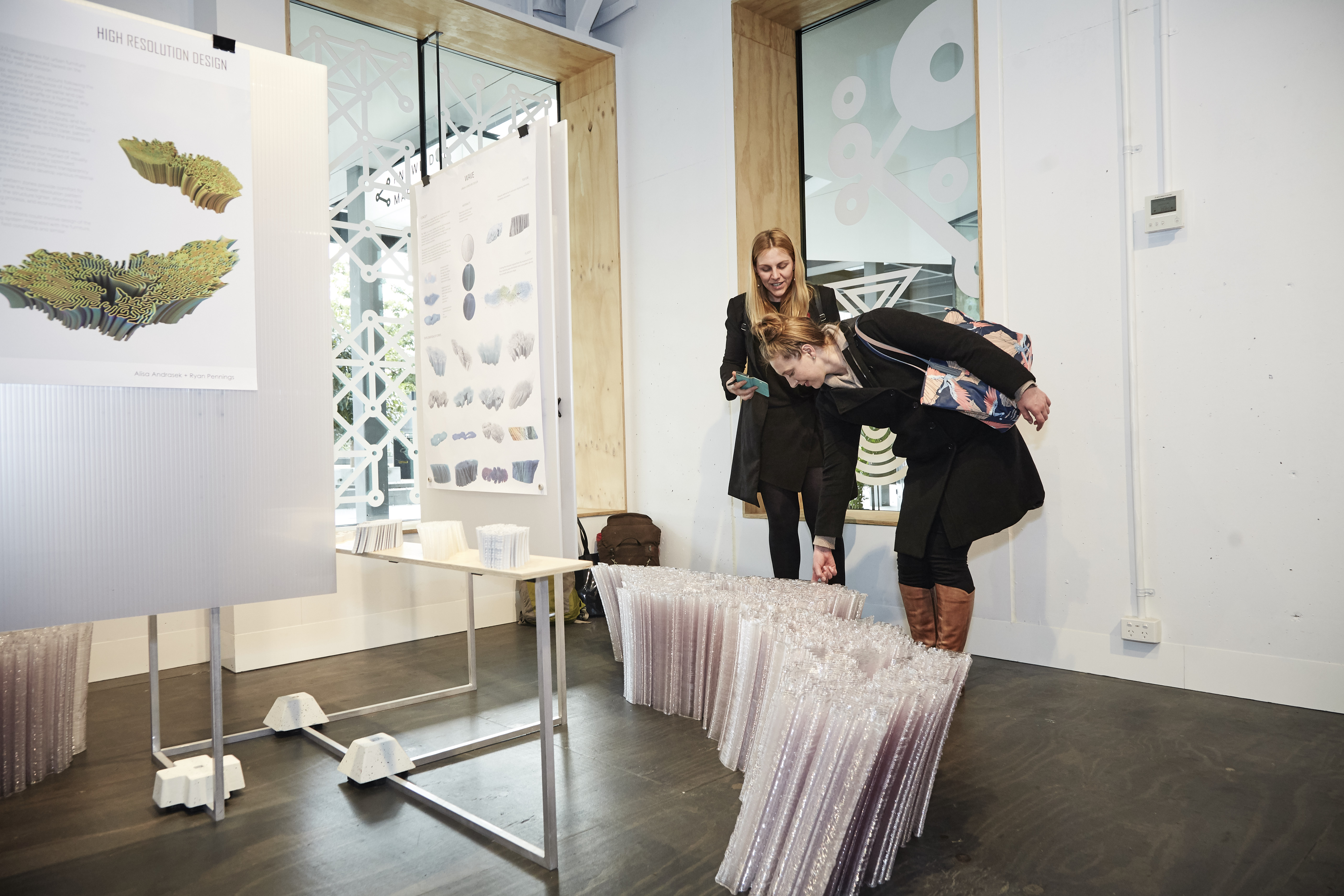
Knowledge Market is a creative hub for sharing ideas. Since its inception in 2016, it has hosted inspirational mentors and facilitators and fostered many new creative projects and partnerships. The Exchange at Knowledge Market is the next phase in the evolution of this innovation space.
The Exchange explores the concept of community and new ways of understanding the shared urban environment through a curated series of public workshops, exhibitions, forums and community events. This year-long living lab is a space created by the community for the community.
Visit the Knowledge Market website.
If you would like to get involved with this project, fill out the form below or reach out to project leaders via the contact info provided alongside each bio.
People
Ross Mcleod
Program Manager, Design Innovation and Technology
School: Architecture and Urban Design
+61 3 9925 3493
RMIT staff profile
ross.mcleod@rmit.edu.au
Ross McLeod is Program Manager of Design Innovation and Technology at RMIT University, Melbourne. Over the past twenty years Ross has worked as both a designer and as an academic, completing a wide range of one-off and production furniture designs, interior architecture projects, exhibitions designs and sculptural works both locally and internationally.
As a designer, educator and academic he is committed to the development and realisation of design projects, teaching practices and research activities that extend the boundaries of contemporary design and the sensibilities that surround it. His experience in the fields of product design, furniture design, interior design and architecture have been instrumental in the establishment of a creative practice that spans the design disciplines.
News and updates
DCP Lectures | Dr Anne Galloway
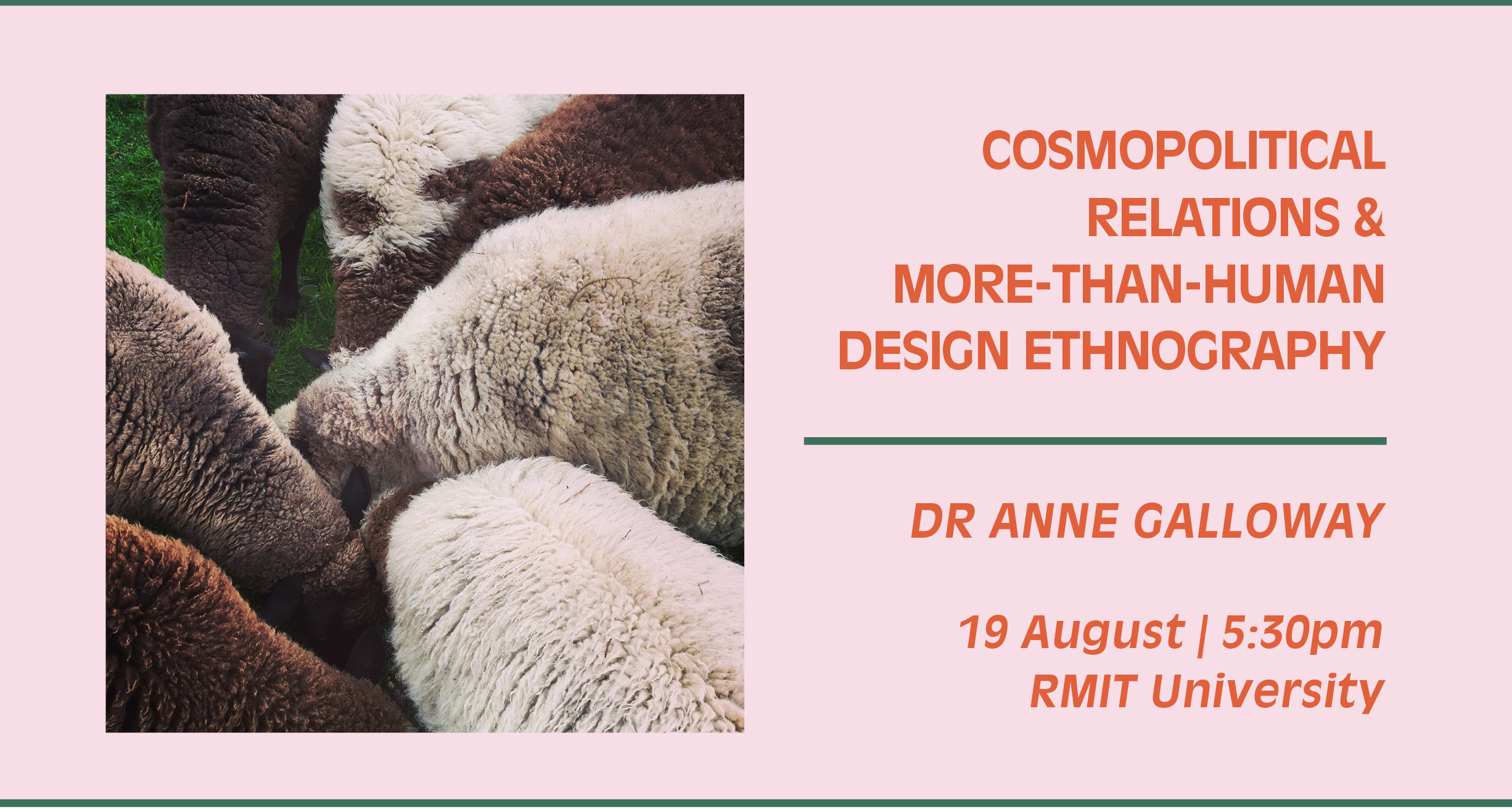
Cosmopolitical Relations & More-Than-Human Design Ethnography
Monday 19 August, 5:30 – 6:30pm
RMIT City Campus, Building 80.10.16 Read more
HDR HIGHLIGHT: Caitlin McGrane
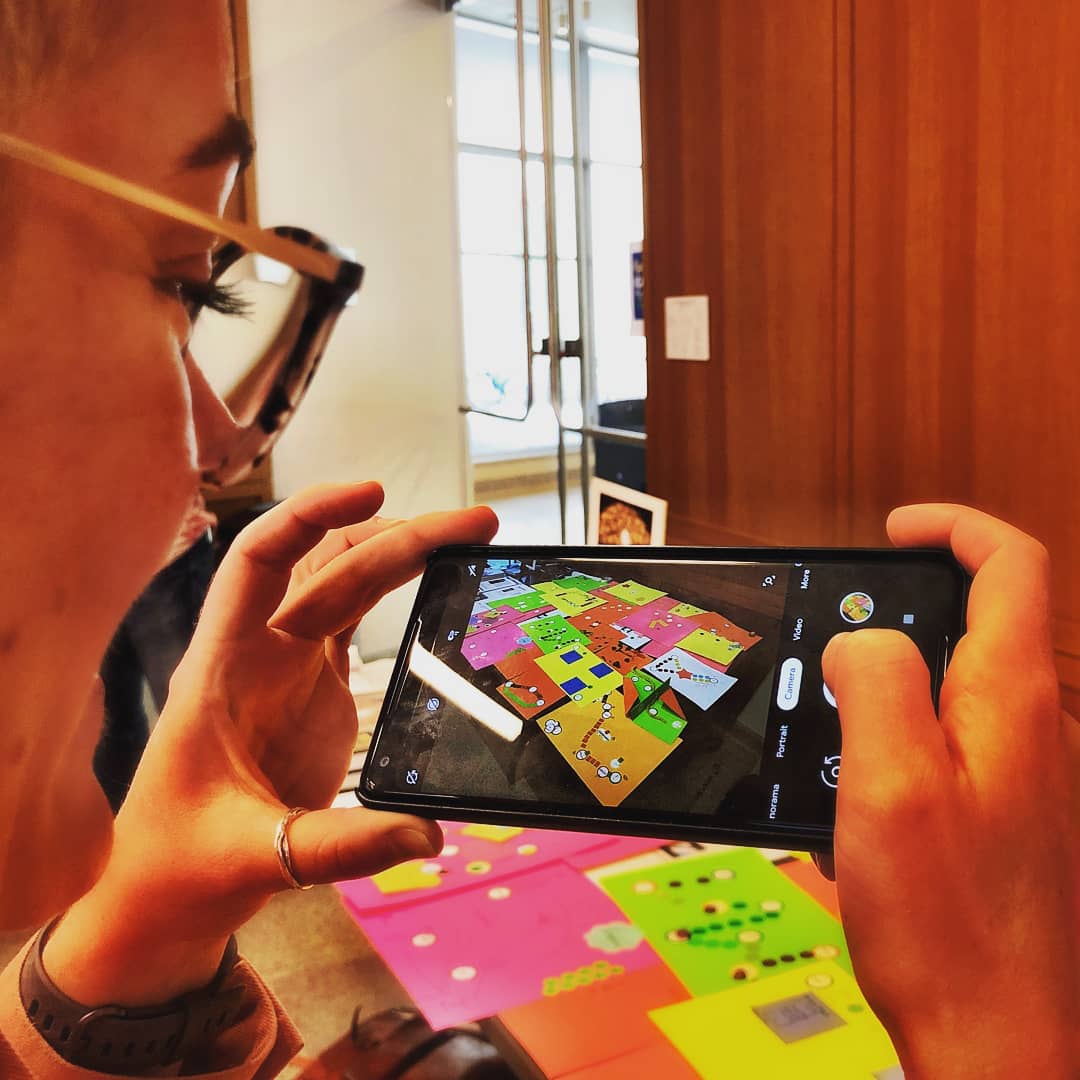
Caitlin McGrane
PhD candidate in the Digital Ethnography Research Centre Read more
2nd MARC END OF LIFE CARE FORUM
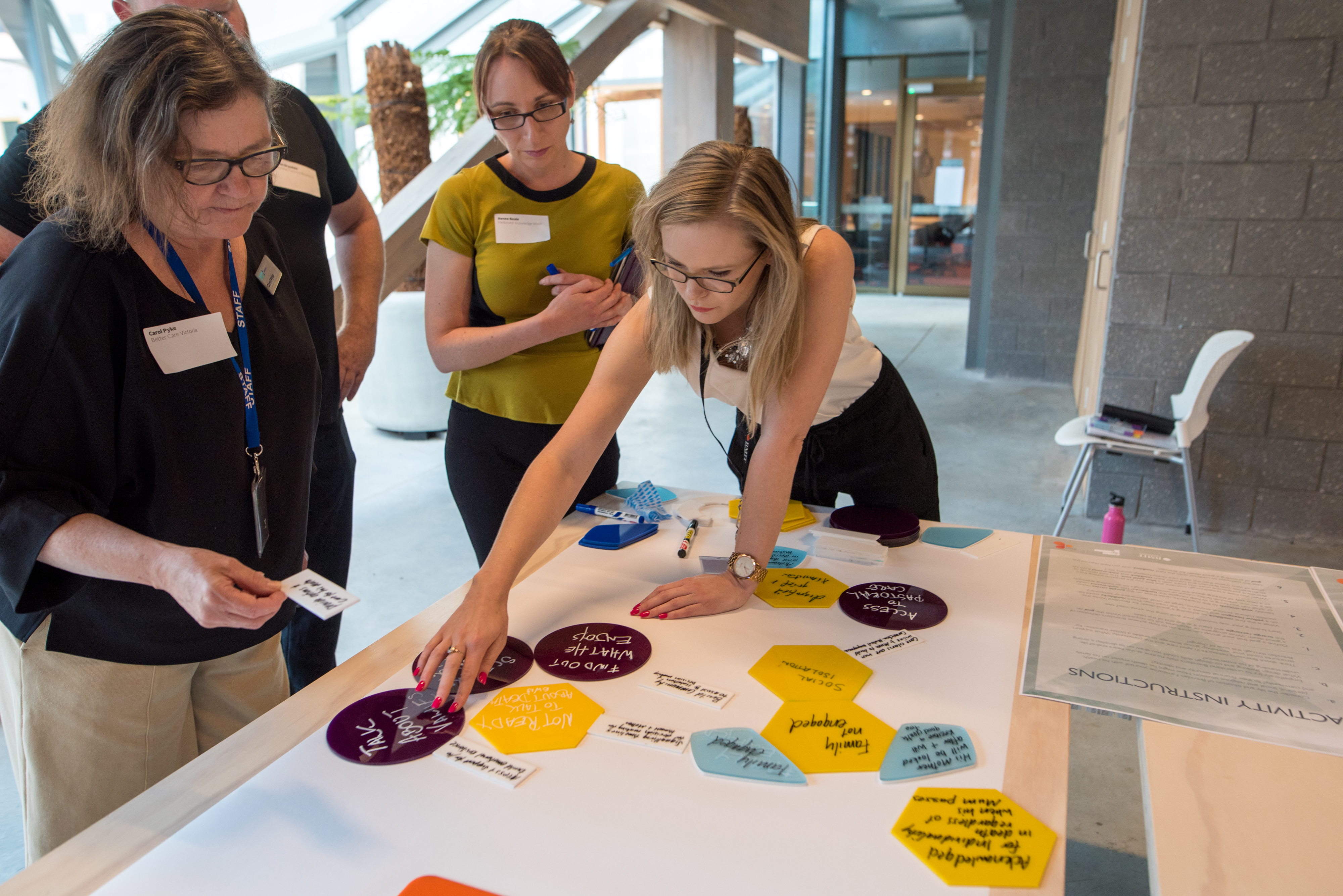
The Melbourne Ageing Research Collaboration (MARC) is hosting the 2nd MARC End of Life Care Forum at RMIT University. Speakers will provide detailed examples of recent research to stimulate ideas. Read more
Centre for Innovative Justice Perpetrator Service Mapping – 2018 Good Design Award, Communication Design Print
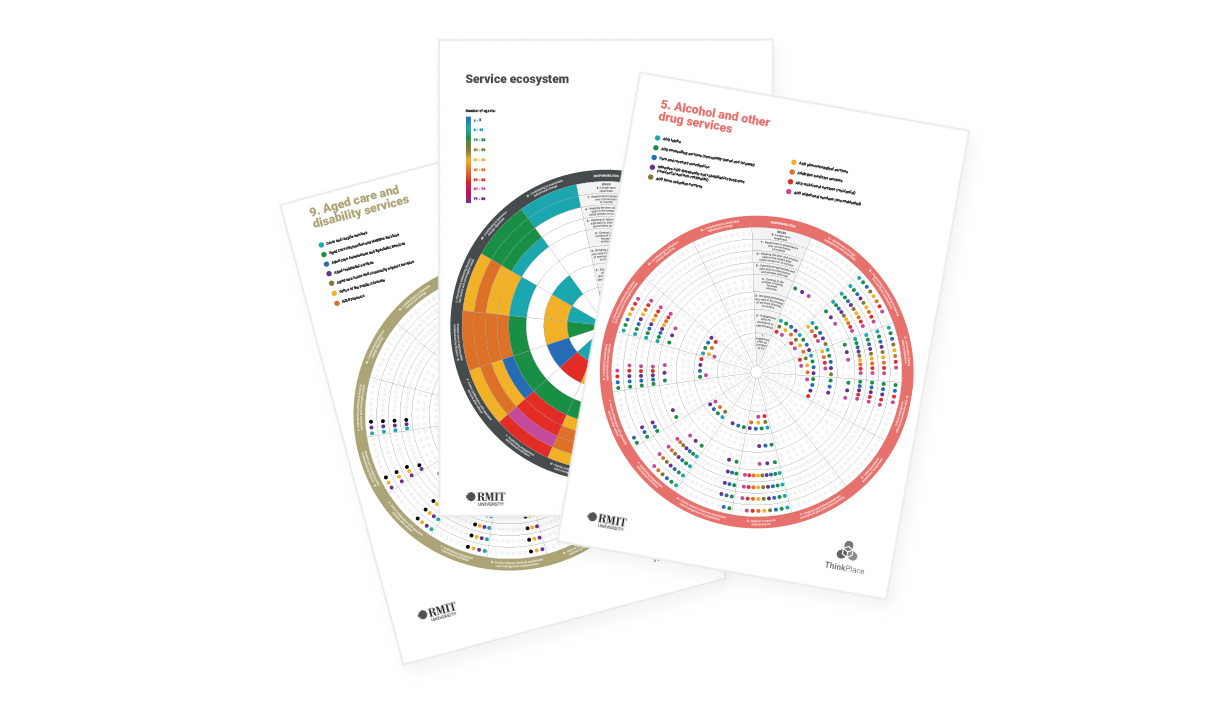
RMIT’s Centre of Innovative Justice worked with ThinkPlace to transform a complex dataset which maps the roles and responsibilities of all government and non-government agencies and service providers who have contact with perpetrators of family violence in Victoria into a stunning set of visualisations. Read more
EFI Conference 2018
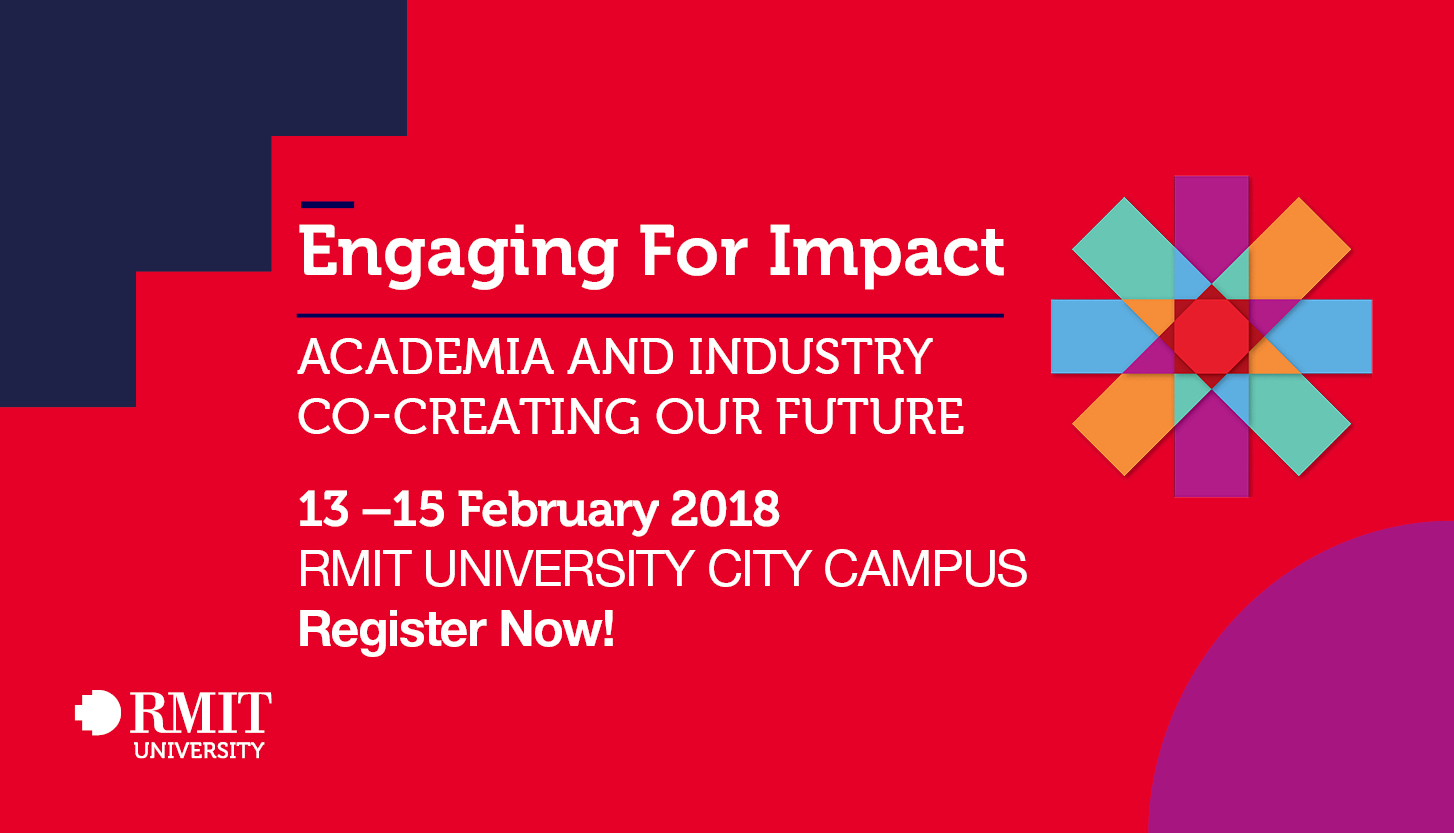
At Engaging for Impact 2018 Conference, RMIT’s eight Enabling Capability Platforms will share their knowledge and demonstrate how their expertise can address the world’s most critical issues. The Social Change ECP and Design and Creative Practice ECP, along with Biomed ECP, have curated The Future of Care stream. Read more
HDR Opportunity: Dr Anne Galloway Workshop
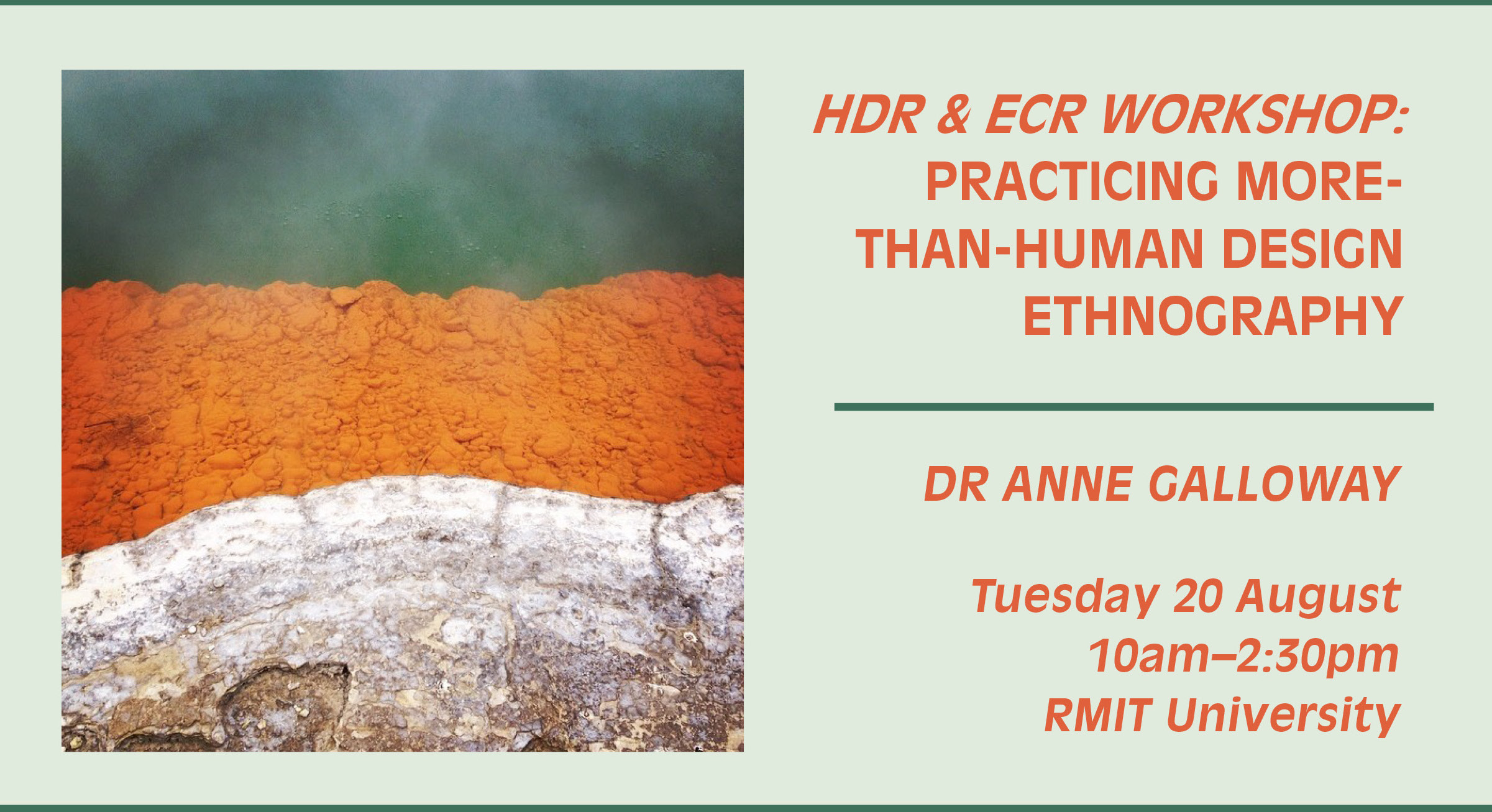
Practicing More-than-human Design Ethnography Workshop
Dr Anne Galloway, School of Design, Victoria University of Wellington, NZ
Tuesday 20 August 2019, RMIT City Campus Read more
People
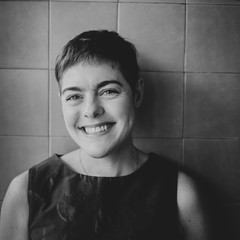
Caitlin McGrane is a feminist researcher and activist. Her doctoral research investigates how women’s feelings about their smartphone uses and practices can help challenge normative and misogynistic notions of women’s communications. She leads Gender Equity Victoria’s (GEN VIC) ‘Enhancing Online Safety for Women’ project advocating for better support and conditions for women working in media. In 2018 – 2019 she worked with GEN VIC to design a toolkit and a series of videos encouraging prosocial bystander actions on social media. She has worked on projects with the Victorian Trades Hall Council Women’s Team building an online resource to supplement their Gender-Based Violence in the Workplace training package. Her previous research has explored how witnessing anti-feminist harassment can negatively affect individuals’ willingness to publicly identify as feminist and participate in online spaces.
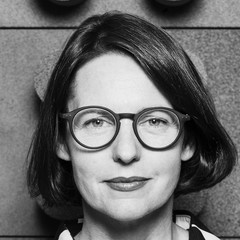
Dr Fleur Watson is a curator and editor specialising in architecture and design.
Fleur Watson was the Curator at RMIT Design Hub – a building dedicated to cross-disciplinary design research and experimentation. Fleur has managed and co-curated a diverse range of exhibitions for Design Hub including Las Vegas Studio, Brook Andrew : De Anima, The Future Is Here (in collaboration with London’s Design Museum), 100 Chairs in 100 Days: Martino Gamper and, most recently, Occupied curated with Otherothers. Extending upon her curatorial role, Watson leads the RMIT University design partnership with the National Gallery of Victoria and recently contributed as an invited judge for the NGV’s architecture competition towards the 2016 NGV Summer Architecture Commission.
In 2013, Watson was an invited architecture and design curator for the National Gallery of Victoria’s Melbourne Now exhibition and co-produced the installation Sampling The City. She also founded Pin-up Architecture & Design Project Space – an independent exhibition space in Collingwood (2011−2014). Watson is a former editor of Monument magazine (2001−2007), the editor of the Edmond & Corrigan monograph Cities of Hope: Remembered/Rehearsed and, most recently, co-edited an issue of Architectural Design UK (May/June 2015) with RMIT University’s Innovation Professor of Architecture Leon van Schaik AO. In 2015, she completed a practice-based PhD at RMIT University entitled The Agency of Encounter: Performative curatorial practice for architecture and design.
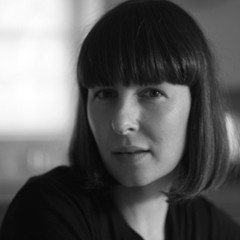
Kate Rhodes was a curator at RMIT Design Hub, a new, purpose-built, 10-storey home for design exhibitions, programs and research in Melbourne. Kate has been creative director of the State of Design Festival, and curator of its Design for Everyone program. She has worked as adjunct curator at Object: Australian Centre for Craft and Design, and as editor of Artichoke, an architecture and design magazine. She has also worked as a curator at the National Design Centre and at Craft Victoria, and was assistant curator of Photography and Contemporary Art at the National Gallery of Victoria for five years. She completed a Masters of Art Curatorship at the University of Melbourne in 2002, and a Masters of Design Research in RMIT’s Faculty of Architecture and Design in 2010. Kate is a founding member of the Office for Good Design, and is currently an editorial advisor at ARTAND Australia magazine.
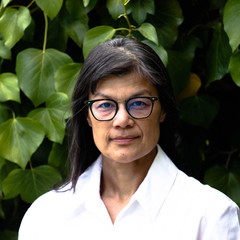
Michelle Aung Thin is a writer, former advertising copywriter and scholar. She is a Lecturer at RMIT University and teaches across the disciplines of Creative Writing and Advertising. Her most recent novel, Hasina (Allen & Unwin 2019) is about Rohingya ethnic cleansing and is published as Crossing the River Farak (Annick 2020) in Canada and the USA. Her first novel, The Monsoon Bride, (Text 2011) is set in colonial Burma and was shortlisted for the Victorian Premier’s Literary awards as an unpublished manuscript. Her writing has been included on VCE reading lists and republished on the SBS website. In 2017, she was a National Library of Australia Creative Arts Fellow (supported by the Eva Kollsman and Ray Mathew Trust) and in 2014, the first Asialink writer in residence to Myanmar (funded by Arts Victoria).
Michelle was a co-director of the non/fictionLab in 2018 and 2019, is currently a co-director of WrICE, Writers Immersion and Cultural Exchange and has served on the board of The Lifted Brow. Her research interests range from the cultural history of southeast Asian hybrid identities to contemporary creative practices in Myanmar and the ethics of writing about difference. Current research includes a project addressing diversity in publishing and a pilot study that aims to reduce sexist advertising by educating the next generation of advertising creatives about harmful stereotypes.
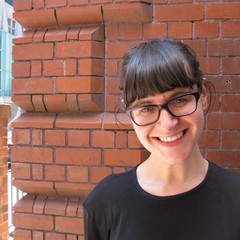
Nella Themelios is a curator, writer and producer. She currently holds the position of Creative Producer at Design Hub, RMIT and is also the Chair of the Board of Victorian artist run initiative, Bus Projects. Previous to this she was the Coordinating Curator at Craft Victoria, the peak body for craft and design in Melbourne. She holds a Bachelor of Arts (Cultural Studies) and a Graduate Certificate (Art History) from the University of Melbourne and is currently completing a Masters degree in Curatorship at the same institution. She has written numerous catalogue essays and produced projects across a variety of disciplines. Recent curatorial projects include: Signature Style (2013) (a NETS touring exhibition); Dolci & Kabana: #thathautecouturefeeling (with Ricarda Bigolin) (2013); Bless: No 38 Windowgarden (2011); Play with your Food (with Drew Pettifer) (21010÷11), The Sound Playground (with Amelia Barikin) (2010); Chicks on Speed: Viva la Craft! (2009).
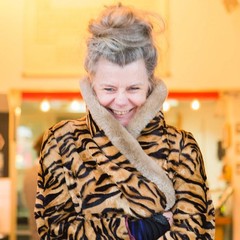
Francesca Rendle-Short is Associate Dean Writing and Publishing in the School of Media and Communication at RMIT University in Melbourne, Australia. She is co-founder of the non/fictionLab research group and co-director of WrICE (Writers Immersion and Cultural Exchange). She has a Doctor of Creative Arts from the University of Wollongong, was a recipient of an International Nonfiction Writers Fellowship to the University of Iowa, and was showcased in the Outstanding Field at Victoria College of the Arts, University of Melbourne.
Francesca Rendle-Short is an award winning novelist, memoirist and essayist. Her books include Bite Your Tongue, Imago, and The Near and The Far; also the forthcoming 100 Love Letters, and No Notes (This is writing). Her artwork is in the collection of the State Library of Queensland.
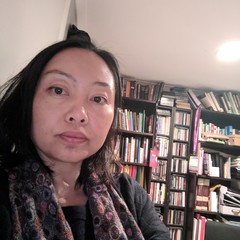
Dr Olivia Guntarik is interested in the relationship between people, places and technologies. She has co-designed and curated place-based cultural walking trails with Indigenous community groups, using mobile apps as self-guided digital tour guides, and as a way to commemorate sites of historical significance. She has led numerous industry-based research projects that bring together writers, artists, designers and digital experts with geographers, sociologists, ethnographers and educators. She was awarded two distinguished Creative Victoria funding initiatives, co-supported through the Department of Education and Training under the Virtual Creative Professionals in Schools program, to provide schools in rural and regional locations with the highest quality creative and digital learning experiences. Research outcomes included the development of interactive mobile apps and site-specific public installations, providing new ways to document and understand user engagement, participation and impact.
Interdisciplinary conservation scientist, Senior Research Fellow, NESP Threatened Species Recovery Hub; Senior Lecturer, School of Global, Urban and Social Studies; ICON Science Research Group, Centre for Urban Research, RMIT University, Melbourne
Georgia is an ecologist and conservation scientist. She is a Senior Research Fellow in RMIT’s ICON Science Research Group and Centre for Urban Research, and Senior Lecturer in the School of Global, Urban and Social Studies, where she teaches Ecological Foundations of Planning. For over a decade, she has conducted research that addresses the critical challenge of conserving and enhancing biodiversity in urban environments. Her protocol for Biodiversity Sensitive Urban Design, codeveloped with Prof Sarah Bekessy, was a finalist in the Banksia Sustainable Cities Award 2016. Georgia has contributed to and led projects on biodiversity sensitive urban design for greenfield and urban renewal development projects, with local government (City of Melbourne), industry (GHD) and philanthropic (The Myer Foundation) organisations. She also co-leads projects for the National Environmental Science Program’s Threatened Species Recovery Hub and the Victorian Department of Environment, Land, Water and Planning that aim reconnect people with nature in a way that fosters care and stewardship for nature. She is a CI on a current ARC Linkage Project (Designing green spaces for biodiversity and human well-being), with project partners the City of Melbourne, ARUP, Greening Australia and Phillip Johnson Landscapes.
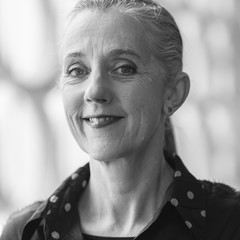
Since 1991, Associate Professor Suzie Attiwill’s freelance practice has involved exhibition design, curatorial work and writing on interdisciplinary projects in Australia and overseas. Her practice poses questions of interior and interiority in relation to contemporary conditions of living, inhabitation, subjectivity, pedagogy and creative practice. Research is conducted through a practice of designing with a curatorial inflection attending to arrangements (and re-arrangements) of spatial, temporal and material relations. Projects include: urban + interior – a collaborative publication project bringing together an editorial team situated in Milan, Madrid and Melbourne; beyond building with Gregory Nicolau (Australian Childhood Trauma Group); Abacus Learning Centre – for children on the autism spectrum; and a series of curatorial experiments in ecologies of learning – physical, social and mental. Suzie is recognised internationally for her contribution to the discipline of interior design including workshop intensives: Radical Learning, Milan International Architecture Week; and Urban Interiorities in Nicosia, Cyprus; texts: ‘interiorizt’, 2014; and ‘Urban and Interior: techniques for an urban interiorist’, 2011. Artistic director of Craft Victoria (1996−99); board member/chair, West Space (2006−10); chair, IDEA (Interior Design/Interior Architecture Educators Association, 2006-12); executive board member, International Federation of Interior Architects/Designers (2020−21).
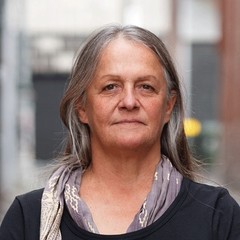
Dr Couzens is Gunditjmara from the Western Districts of Victoria. She acknowledges her ancestors and elders who guide her work.
Dr Couzens has worked in Aboriginal community affairs for almost 40 years. Her contributions in the reclamation, regeneration and revitalisation of cultural knowledge and practice extend across the ‘arts and creative cultural expression’ spectrum including language revitalisation, ceremony, community arts, public art, visual and performing arts, and writing. She is a Senior Knowledge Custodian for Possum Skin Cloak Story and Language Reclamation and Revival in her Keerray Woorroong Mother Tongue.
Vicki is employed at RMIT as a Vice Chancellors Indigenous Research Fellow developing her Project ‘watnanda koong meerreeng , tyama-ngan malayeetoo (together body and country, we know long time)’ The key objective of this Project is to produce model/s, pathways and resources for continuing the reinvigoration of Aboriginal Ways of Knowing Being and Doing with a special focus on language revitalisation.
